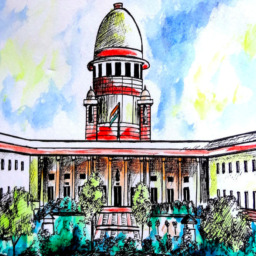INTRODUCTION
The abrogation of Article 370 was said to bring out solidarity in the nation, and it also promised the extensions of all the rights which is mentioned under the Indian constitution to the state of Jammu and Kashmir. However, draconian laws like the Public Safety Act are still in place. With the increase in the differences of opinions amongst the general public and the authorities, these laws have become more stringent which is, in turn, resulting in greater turmoil and also going against a few other laws of the country. Before dwelling on the contradiction of PSA, 1978 with other preventive detention laws, it is vital to know the origin and how the law has evolved to the present.
Public Safety Act came into force in the year 1978, it was initially brought into place to use against timber smugglers. Nonetheless, the purpose and dynamic of the law diverted when the president of Kashmir Motor Drivers Association was arrested when he stood against Sheikh Abdullah in the previous election on Janata Party ticket. Needless to say, since then there has been a rampant usage of the law in political aspects and also. Furthermore, when there was a rise in terrorism in Kashmir, the administration of the act became more widespread. As mentioned, PSA, 1978 is a preventive detention law, as per this law, a person can be taken into custody just to prevent him or her from taking any actions which can be considered prejudicial to the ‘security’ of the state or ‘maintenance of public order.’ Although there already exists national legislation for preventive detention- National Security Act, PSA is still in place. There has been a long-standing opinion stating, now that the state has become a union territory, PSA should be brought along the lines of all Indian legislation. But there seems to be no hint of making such changes in this regard through any actions from the government.
Political tension has always prevailed in a place like Jammu and Kashmir, apart from the unbridled usage of the PSA act, laws like the Unlawful Activities Prevention Act is also used excessively. As per the recent police data, in the years 2019 and 2020, 819 people from Jammu and Kashmir have been arrested under the UAPA, and 95 people in 2021 have been detained under the PSA act alone. Furthermore, this report also noted that, in the year 2020, the number of cases registered under UAPA was more as compared to PSA. Nonetheless, people booked under the PSA are still said to be missing, and there has been no information about them whatsoever. India, already has multiple legislations which look after preventive detention, while it can be accepted that there was a need for stricter detention laws due to political, terrorist activities, these laws should not infringe upon the basic rights ensured to all the citizens of India. This blog attempt to shed light on the ambiguous sections of the Public Safety Act, and its contradictions with the already existing detentions laws.
ISSUES IN PSA
Public Safety Act is entirely on a different footing as compared to the other laws of India as it is only applicable to one part of the nation. This act bestows upon the administrator uncontrolled power which results in misuse of the law. Adding to this, the limitless authority also causes a lack of transparency and accountability in the justice system. Supporting this outcry, the 2011 report of Amnesty International portrayed the act as ‘lawless law’ and commented on how the law which was enacted to ensure public safety was being misused to detain people without a trial and depriving them of basic human rights as well.
Bookings under PSA is a perpetual cycle, to control the assumed insurgency in the state, the authorities immediately slap the released person with yet another booking under the PSA to keep them behind the bar. It is used as a revolving door. And this exertion of law is due to the absence of checks and reporting and the various open-ended terms used in the act itself. The below section analyses a few provisions of the Public Safety Act chronologically which are ambiguous.
- Section 8 of the PSA: Section 8 of the act establishes a few grounds based on which a person can be preventively detained. However, section 8 (1) mentions the phrase ‘acting in any manner prejudicial to the security of the state or maintenance of the public order’ remains open-ended. What action constitutes to be against the public order has not been determined. One might simply overlook the phrase and tend to come to terms with it, but in a highly militarized zone like Kashmir with increasing political tensions every day, terms that are mentioned in the act should have a scope limited only to threatening activities. Mere suspicions should not be the grounds for detaining innocent civilians. The arbitrariness of the provision itself and the discretionary power it grants to the district collectors and magistrates creates issues and threatens the harmony of the place. Adding to this, the lack of differences between major and minor offences under this act also results in the unreasonable detention of the people living in the state.
- Section 13(1) and Section 13(2): this section establishes that the reason and grounds of the said detention should be communicated to the detenu, within 5 days and in a language in which the detenu understands and also should be allowed to represent against the order of the government. But in the same section, clause 2 states that the authority is not bound to disclose the facts upon which the detenu is held if it is considered to be against the public interest. By a general reading of this section, it can be said that section 13(1) mentions the rights of the detenu. But the subsequent clause contradicts this right and yet again remains to be arbitrary and bestows unbridled discretionary power to the authorities. While it grants the right for the detenu to present himself, it also takes away the same making it a double-edged sword.
- Section 14: This section mentions the framing of the advisory board, the board which decides about the detention and passes on the subsequent orders to follow. As per the act, the board was constituted to make sure there exists no arbitrary use of the PSA adding to this, the chief justice of J&K was also made a part of the board. But in the year 2018, an amendment to this section was brought upon, which excluded the judiciary and vested the majority of the powers to the chairman of the board. This added more to the absence of transparency in the system and sometimes led to situations where even the courts quashed the detentions, the person kept under PSA had been re-detained.
- Section 17: Section 16 and section 17 of the act mentions the decisions taken by the advisory board and the actions which follow them.
Section 17(1) mentions that “in any case where the Advisory Board has reported that there is in its opinion sufficient cause for the detention of a person, the Government may confirm the detention order and continue the detention of the person concerned for such period as it thinks fit.” As mentioned earlier, this provision grants unchecked power to the advisory board which also has very little judiciary involvement. This law is set out to ensure that the advisory board has to examine every detention order issued by the magistrate before making the final decisions but based on the numerous RTI’s filed by legal activists it found out that the court had quashed more than 81% of the detention orders that the advisory board had upheld.
- Section 19: This is the infamous section of the entire act. As the provisions of section 13, section 19 is also two-fold in nature. The first clause states the detention can be revoked at any point in time but the following clause puts forward that there shall be no bar on how many times a fresh order can be passed for detaining the same person. There is no end to this hard cruelty and the procedures keep going on in a loop.
- Section 21 this section establishes that offences under the PSA act are non-bailable. As mentioned earlier, there is a clear lack of distinction between major and minor offences, this also encroaches upon the laws as per the criminal procedure code which has clear measures for preventive detention for minor and major offences. Furthermore, since the offences under PSA is non-bailable it also restricts the scope of the legal remedies which can be obtained by the detenu.
CONTROVERSIAL CHARACTERISTICS OF PSA
Article 21 of the Indian Constitution mentions the right to life and liberty to everyone in India. Although in the case of AK Gopalan the court took a limited view of article 21 and held that detention could be justified merely on the ground that it was conducted in accordance with the ‘legally-established procedure’ the scope of the article was expanded in the subsequent case of Maneka Gandhi and the decision of AK Gopalan case was overturned. Additionally, it can be safely said that PSA is violative of Article 21 after the 44th amendment of 1979. But for the last 44 years, the same amendment has not been brought to force by the government, and the rights enshrined under Article 21 of the constitution are continually denied to the innocent detenu.
Also from the above sections it can be seen that, if the district magistrate decides not to reveal the facts and grounds for detention, it also hampers for the detenu to represent themselves in the court of law, which in turn goes against Article 22(5) of the Indian constitution. But to the dismay of the general public, the supreme court in the case of The Secretary to Government, Public (Law and Order-F) and another v. Nabila and another held that “Personal liberty is one of the most cherished freedoms, perhaps more important than the other freedoms guaranteed under the Constitution. It was for this reason that the Founding Fathers enacted the safeguards in Article 22 in the Constitution to limit the power of the State to detain a person without trial, which may otherwise pass the test of Article 21, by humanizing the harsh authority over individual liberty. In a democracy governed by the rule of law, the drastic power to detain a person without trial for the security of the State and/or maintenance of public order must be strictly construed. However, where individual liberty comes into conflict with an interest of the security of the State or maintenance of public order, then the liberty of the individual must give way to the larger interest of the nation.” Yet again the question which arises here is that what offence can be considered as an offence against the public order? The fragility and tension between the authorities and people of the state are so volatile that even a simple dissent is considered as an offence against public order.
Over and above that, the United Nations in its UN human rights body report also condemned the Public Safety Act. The UN report, titled ‘Report on the Situation of Human Rights in Kashmir: Developments in the Indian State of Jammu and Kashmir from June 2016 to April 2018, and General Human Rights Concerns in Azad Jammu and Kashmir and Gilgit-Baltistan’, revealed that over 1,000 Kashmiris were held under the PSA between March 2016 and August 2017. The report also described that the public safety act is a direct invasion of human rights and the authority is not competent enough to verify the facts either which results in unlawful detention.
CONCLUSION
Based on the facts and the analysis presented above, it can be safely concluded that PSA does encroach upon the already established preventive detention measures. Preventive custody under section 107 of the CRPC has more scope than PSA, and the stricter measures which are mentioned under the PSA should be curbed down. There is a need for more check and balance and accountability in the advisory board itself and there exists a need for strong procedural safeguards for the detenu’s under this law. Additionally, the report of the Group of Interlocutors for Jammu and Kashmir held that the sweeping powers in Public Safety Act make it open to misuse. It recommended:
- The detention period should range from one week for minor offences to one month for major offences. Assuming that actions ‘prejudicial to the security of the State’ constitute far graver offences, three months’ detention should be ample for proceeding to trial. Juveniles should not be held under the PSA at all. Nevertheless, there has to be a clear demarcation between dissent and sedition, expression, and incite to distinguish what is against the public order, and this is the main aspect that falls short in the public safety act.
Author(s) Name: Ananya K (Presidency University, Bangalore)
















